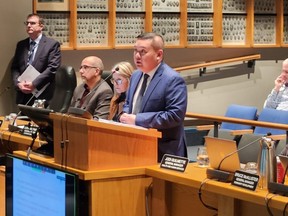Chatham-Kent council will grapple with how to fund needed infrastructure while still attractive housing and economic growth when the contentious development charges issue returns this month.

Chatham-Kent council will grapple with how to fund needed infrastructure while still attractive housing and economic growth when the contentious development charges issue returns this month.
Advertisement 2
Article content
Byron Tan, a consultant with Watson and Associates, presented a background study at Monday’s meeting.
Article content
“It is a revenue tool to provide municipalities a recovery for growth-related costs related to infrastructure and capital, for residential and non-residential,” he said.
The process began last October, with the draft bylaw released in January.
Monday was strictly for the presentation, public feedback and council comments. Council is to vote on the recommendation March 18, a week before the current bylaw expires March 25.
Under Ontario’s Development Charges Act, growth-related costs of certain services such as water, wastewater, roads, police and fire may be fully funded by the charges. There have been a number of amendments to the act in recent years.
Advertisement 3
Article content
Council originally passed the water and wastewater development charge by law in 2004, with updates in 2009, 2014 and 2019.
“Development charges are not mandatory, but they are there to alleviate some of these costs from the existing taxpayers and ratepayers,” Tan said. “If you didn’t have DCs, then really it’s going to be on the general water-wastewater rates. which then everyone pays towards.”
There were several public deputations on Monday. Greg Devries, president of Truly Green Farms, said the increases will be an obstacle to future growth, citing statistics on the benefits of the industry to the community.
“For every acre of greenhouse built, there are seven to eight jobs … created,” he said, adding that in total, the sector has stimulated more than 3,800 jobs in Chatham-Kent.
Advertisement 4
Article content
“As an agricultural-based community, we should be supporting and driving this type of growth.”
Devries said his company has bank approval to move ahead with a 30-acre (12-HECTARE) build at its Cedarline location, slated for completion in 2026.
“In our budget, we have $274,440 allocated to development fees, and $1.4 million to bring the actual water line to our site,” he said. “Two years from now, our $274,000 development charges will go to $2,835,750.”
According to a staff report, the municipality and public utilities commission plan to spend $590.49 million over the life of the bylaw, of which a net $389.27 million is recoverable from development charges. Of that, $60.52 million is recoverable from residential development and $328.75 million from non-residential development.
Advertisement 5
Article content
“It has to be collected somewhere to pay for infrastructure,” said PUC general manager Darren Galbraith, PUC general manager.
West Kent Coun. Lauren Anderson said council is in a tough spot trying to balance the importance of industrial growth without pushing more costs onto residents.
“It puts us in a difficult situation of how we afford that, but also encourage (development),” she said. “I don’t know the answer to that.”
South Kent Coun. Anthony Ceccacci expressed similar sentiments, saying the municipality can’t keep asking for money from companies wanting to invest.
“That just gets us nowhere,” he said. “I do anticipate some challenging conversations in the next couple of weeks.”
For the full development charges study, visit pub-chatham-kent.escribemeetings.com
Article content